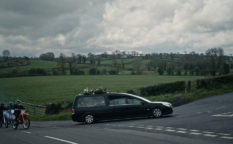Review: Courage (2021)

There is no much difference between the personal, the artistic and the political courage since all three are usually connected and intertwined. Courage should not be confused with desperation and stupidity, it is always based on a conscious decision to act with some of the risk calculated into it. Life in tyranny is not that hard after all, it is necessary for the individuals to shut down their hearts and minds, but it is unbearable for those who refuse to do so.
A documentary titled Courage, written and directed by Aliaksey Paluyan, deals with all three mentioned types of courage by closely following the trio of the actors of the underground Belarus Free Theatre during the days around the August elections and the protests that followed in Belarus. It has recently premiered at this year’s edition of Berlinale (section Berlinale Special) and, due to the hotness of the very topic and the, it is destined to go places in the foreseeable future.
Let us deal with some of the key terms here first. The recent history of Belarus is pretty much a bloody one and it runs in cycles. The country has been ruled by the dictator Alexander Lukashenko since the mid-90s with a neo-Soviet ideology and the almost Stalinist iron fist. His closest ally is Russia, although his relationship with Putin is not that harmonious, but the reason for the support from the Russian dictator is pretty prosaic: for Russia, Belarus functions as a buffer towards the EU and NATO. The cyclic nature of life in Belarus is marked by the elections that go on always based on the same scenario: the opposition leaders (who are alive and present, meaning neither kidnapped, exiled nor killed, which also tends to happen) get close to the electoral victory, Lukashenko then rigs the results blatantly, the protests ensue and they are crushed by the police, regular and riot. There is not much available for the Western countries to do: they can accept some of the political refugees or put additional pressure on the régime with economic and political sanctions, but no real intervention is a viable option.
The second key term here is Belarus Free Theatre, an underground institution that operates on secretive locations around Minsk, whose founders and house directors Nikolai Khalezin and Natalia Kaliada emigrated to London in the early 2000s and are directing the plays via Skype from there. It is a political theatre that survives in deep underground and under the constant threats from the authorities. Courage is not the first documentary that thematizes it, Madeleine Sackler’s Dangerous Acts Starring the Unstable Elements of Belarus had a healthy festival and niche theatrical run after its premiere in 2013.
The three courageous protagonists of Courage are three actors: Pavel Haradnizky, Marina Yakubovich and Denis Tarasenka. We meet them as they are working on the play called Dogs of Europe under Khalezin’s direction. The election day is nearing and there is a sense of fraud coming their way. The three of them are in the different stages of life and therefore have different attitudes, priorities and dilemmas. Pavel is organized and dedicated to the non-violent activism. Marina is a mother of a toddler that takes much of her time. Denis is the oldest and the most cynical of the trio, which is understandable given that he cannot support himself by acting only, so he holds a day job in an auto repair shop. All three of them are bothered by differently formulated, but essentially the same things: whether the resistance is futile, if they should stay or they should go (they are “lucky” enough to have the connections to pass the borders to Poland or Ukraine), and if the hope is stronger than fear.
Then there come the elections and the fraud, people gather on the streets for peaceful protests, the police and the feared OMON special forces intervene, people are being put under arrest and tortured in prisons and detention centres. None of our protagonists were that unfortunate to get locked up, but some of the BFT members were. There is a sense of pressure and urgency, not unlike as what we saw in Maidan-themed documentaries, Evgeny Afineevsky’s Winter On Fire and Sergei Loznitsa’s Maidan, but the sense of uncertainty is highlighted by the fact that the outcome is still unknown, at least on the “real” political scale.
There are moments that are quite strong, though, like those when the parents of the arrested protesters that gather in front of the prison to try to find out what happened to their loved ones and where were they transferred or the instinctive, humane reactions of the young regular police officers who actually do not like their job and are uncomfortable beating up their fellow citizens. Paluyan had the privilege to be on the spot of the action and emotion and he seizes that opportunity. But Courage resonates best at the more quiet, intimate moments, like those Pavel and Marina share with their spouses and Denis with his boss, a disillusioned 55-year-old veteran of the Afghan war and former member of OMON.
Courage is a foreboding film, especially at the very ending; an excerpt from the re-staged play Discover Love thematizes the events from the late 90s, when a businessman and an opposition leader where kidnapped and executed by the OMON. Things rarely change, but it is still worth fighting and courage is necessary.
Runtime: 90’
Country: Germany
Languages: Russian, Belarusian
Directed by: Aliaksei Paluyan
Written by: Aliaksei Paluyan
With: Marina Yakubovich, Pavel Haradnizky, Denis Tarasenka Nicolai Khalezin, Natalia Kaliada, Svetlana Sugako
Cinematography by: Tanya Haurylchyk, Jesse Mazuch
Editing by: Behrooz Karamizade
Music by: Mark Marczyk, Marichka Marczyk
Colourist: Edmond Laccon
Produced by: Jörn Möllenkamp
Production company: Living Pictures Production
Sales by: Rise and Shine
















